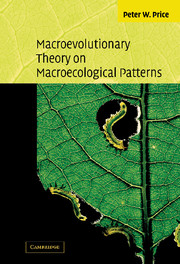Book contents
- Frontmatter
- Contents
- Preface
- Acknowledgments
- 1 The general thesis
- 2 Historical views on distribution, abundance, and population dynamics
- 3 The focal species – Basic biology
- 4 The focal species – Emergent properties
- 5 The focal group – The common sawflies
- 6 Convergent constraints in divergent taxonomic groups
- 7 Divergent constraints and emergent properties
- 8 Common constraints and divergent emergent properties
- 9 The thesis applied to parasitoids, plants, and vertebrate taxa
- 10 Theory development and synthesis
- Glossary
- References
- Author index
- Taxonomic index
- Subject index
9 - The thesis applied to parasitoids, plants, and vertebrate taxa
Published online by Cambridge University Press: 04 December 2009
- Frontmatter
- Contents
- Preface
- Acknowledgments
- 1 The general thesis
- 2 Historical views on distribution, abundance, and population dynamics
- 3 The focal species – Basic biology
- 4 The focal species – Emergent properties
- 5 The focal group – The common sawflies
- 6 Convergent constraints in divergent taxonomic groups
- 7 Divergent constraints and emergent properties
- 8 Common constraints and divergent emergent properties
- 9 The thesis applied to parasitoids, plants, and vertebrate taxa
- 10 Theory development and synthesis
- Glossary
- References
- Author index
- Taxonomic index
- Subject index
Summary
This chapter is devoted to an examination of possibilities for extending the Phylogenetic Constraints Hypothesis to taxa other than insect herbivores. My ability to accomplish an insightful overview of any other taxon is severely limited for a number of reasons. First, my major research emphasis has been on insects and I know no other group as well. And key observations, intuition, and “strong inference,” as Platt (1964) called it, all play a role in the development of concepts, in biology, usually based on familiarity with a particular organismal group. Moving out of a realm of professional focus certainly lessens the credibility of interpretations developed. Second, insect herbivores live on or in and feed on a very clearly defined resource, the living plant. We can accurately evaluate this resource in many different ways and we can examine precisely how insects respond to resource variation. All of this is much more difficult with plants, granivorous birds, insectivorous birds, bats, and amphibians and planktivorous fish. Third, for each new taxon I consider there is a vast literature characterized by overwhelming detail and underwhelming synthesis, especially that relevant to the thesis proposed in this book. And even with the generous advice of experts in each taxon, I feel that I am only tickling the surface of the question on how the hypothesis applies to plants and vertebrate taxa. A more authoritative treatment requires more space and more time.
- Type
- Chapter
- Information
- Macroevolutionary Theory on Macroecological Patterns , pp. 195 - 219Publisher: Cambridge University PressPrint publication year: 2002



